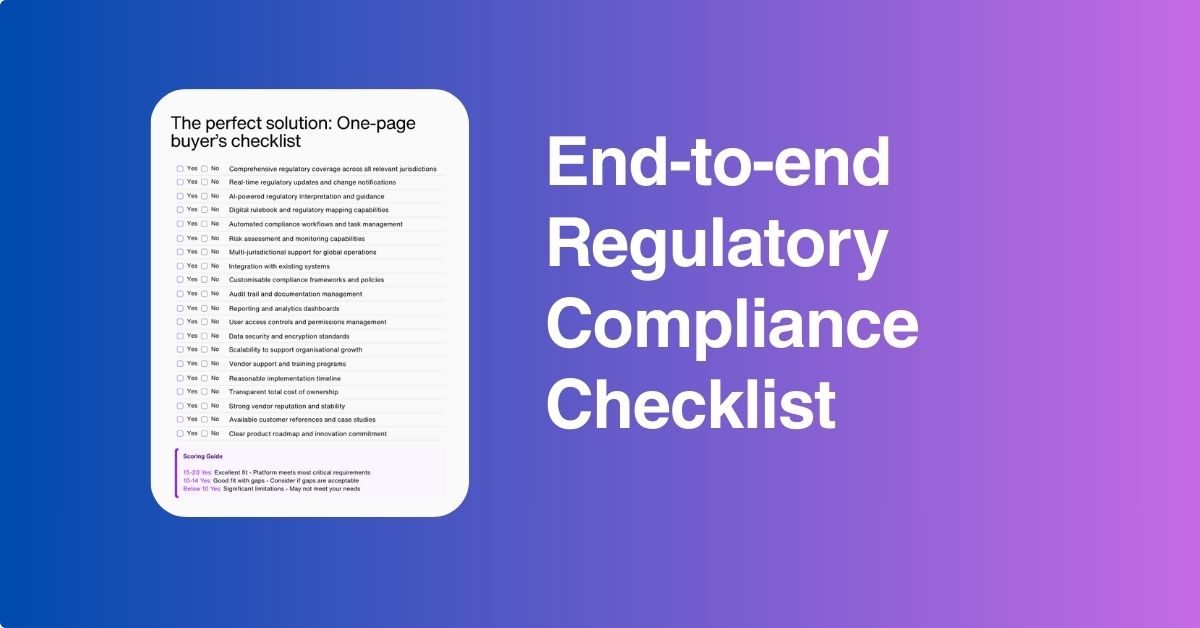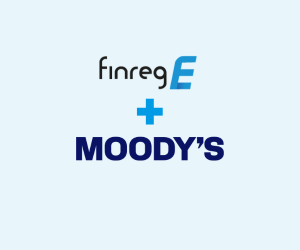This week’s global regulatory round-up highlights key developments across the financial services landscape—from digital asset oversight and AML/CFT reforms to ESG transparency, crypto prudential regimes, and SME capital market access. Regulators continue to refine their frameworks to meet emerging risks, market innovation, and policy goals. This blog captures critical regulatory signals that compliance teams and financial institutions need to stay ahead of.
Key Updates from Week 22
Business Line | Country | Regulator | Regulatory Update | Summary |
All | European Union | European Union | Omnibus Package to Extend SME Benefits to Small Mid-Cap Companies | The European Commission proposed simplifying several EU laws to ease burdens on small mid-cap companies (SMCs). It incorporates the new SMC definition outlined in the accompanying staff working document and allows these firms to benefit from simplified regulatory obligations—such as relaxed conditions for accessing SME growth markets and targeted support measures under national critical infrastructure strategies. The goal is to reduce administrative burdens, enable smoother scale-up from SME to mid-cap status, and enhance the competitiveness of these firms within key industrial ecosystems, all while maintaining legal coherence and policy proportionality within existing EU frameworks. |
European Union | European Commission | Amending IFRS 9 and IFRS 7 to Clarify ESG-Linked Financial Instruments | The European Commission adopted Regulation (EU) 2025/1047 amending IFRS 9 and IFRS 7. The changes clarify how to classify financial assets with ESG-linked features and digital settlement systems. They also introduce new disclosure requirements for equity instruments measured at fair value and contingent ESG-linked features. These changes aim to support the EU Green Deal by enabling ESG loans to qualify under basic lending rules. The amendments apply from January 1, 2026, with early adoption permitted. | |
Jersey | JFSC | The Jersey Financial Services Commission (JFSC) published a consultation to enhance Codes of Practice for sustainability and business integrity risk. Proposed changes embed sustainability risk management into governance, risk, and internal control systems across financial sectors. New rules also target anti-greenwashing, requiring substantiated sustainability claims in advertising and operations. A transition period runs from Q1 2026 to Q1 2027. Feedback is invited by 4 July 2025, with final codes to follow later in 2025. | ||
Luxembourg | CSSF | The CSSF published Circular 25/893, establishing ICT incident and cyber threat reporting requirements under the Digital Operational Resilience Act (DORA). It applies to a wide range of financial entities and payment service providers (PSPs). Entities must classify and report major ICT-related incidents and significant cyber threats using defined criteria and templates via CSSF’s eDesk or API. The circular replaces earlier ICT incident guidance and mandates real-time, structured reporting aligned with EU regulations. PSPs not covered by DORA must comply by November 2025. | ||
New Zealand | FMA | The Financial Markets Authority (FMA) released a new guideline requiring all AML/CFT reporting entities to risk-rate customers at onboarding starting 1 June 2025. Entities must determine, document, and update each customer’s money laundering and terrorism financing risk using a tailored, risk-based model. The guideline provides examples and outlines simplified processes for smaller firms and scorecard-based methods for complex businesses. It emphasizes record-keeping, review frequency, and integration with AML/CFT programmes to strengthen compliance and oversight. | ||
Singapore | MAS | Updated Fit and Proper Guidelines Across Financial Sector Roles | The Monetary Authority of Singapore (MAS) has revised its Fit and Proper Guidelines to reinforce expectations of honesty, competence, and financial soundness across all regulated roles. The updated criteria apply to individuals and institutions regulated under various MAS acts, including banking, insurance, capital markets, and payment services. It also enhances scrutiny of senior appointments, controllers, and material risk personnel. MAS emphasises self-accountability, requiring entities to prove their personnel meet these standards. These updates support enforcement actions, such as prohibition orders, and align regulatory expectations across Singapore’s financial ecosystem. | |
Banking | Chile | CMF | Chile’s Financial Market Commission (CMF) launched a public consultation on a new regulation (Chapter 21-10 RAN) defining minimum requirements for guarantees used to mitigate credit risk. The proposal standardizes admissibility, valuation, and revaluation criteria for guarantees, aligning Chile’s banking rules with Basel III and international benchmarks. It also updates related chapters to ensure consistency across provisioning and capital standards. The initiative addresses gaps identified in the 2022 FSAP and aims to enhance transparency and regulatory coherence in credit risk management. | |
European Union | EBA | Finalised Reporting Framework to Strengthen Crypto Oversight and Pillar 3 Disclosures | The European Banking Authority (EBA) released the final technical package for its 4.1 reporting framework. It enhances the identification and supervision of significant crypto asset providers and supports the Pillar 3 data hub for prudential disclosures. This version includes updated data models, validation rules, and XBRL taxonomies aligned with MiCAR and ESG data needs. The framework, part of the shift to DPM 2.0, takes effect in H2 2025 and aims to streamline regulatory reporting and supervisory data access across the EU. | |
Finland | FIN-FSA | Finland’s Financial Supervisory Authority (FIN-FSA) has issued binding regulations to manage default risks in unsecured consumer lending. Effective 1 June 2025, the rules require credit providers to assess risk using rating systems that apply the Gini coefficient and monitor high-risk credit segments. While no thresholds are set yet, future limits may follow based on submitted data. All providers must report their default risk metrics by February 2026 for the 31 December 2025 reference period. | ||
Hong Kong | HKMA | The Hong Kong Monetary Authority (HKMA) launched a consultation on new AML/CFT requirements for licensed stablecoin issuers. The draft rules apply to issuance, redemption, transfers, and secondary market activities. They propose enhanced due diligence, wallet address verification, transaction monitoring, and controls for unhosted wallets. Licensees must adopt blockchain analytics tools and comply with the Travel Rule. The guidelines align with FATF standards and support the “same activity, same risk, same regulation” principle. Feedback is due by 30 June 2025. | ||
Investment | Canada | OSC | The Ontario Securities Commission (OSC) is moving forward with its Long-Term Asset Fund Project. This initiative supports the development of investment fund products offering retail investors access to long-term assets like infrastructure, real estate, and private equity. The project includes bespoke exemptive relief and will collect data on investor experience and market demand. While rulemaking remains a future possibility, the OSC will prioritize tailored investor protections and engage with industry stakeholders through its LaunchPad platform to support innovation. | |
Canada | BCSC | The Canadian Securities Administrators (CSA) extended the comment deadline to July 2, 2025, for proposed amendments to NI 23-101. These amendments aim to lower active trading fee caps on securities listed in both Canadian and U.S. markets. Stakeholders are encouraged to provide input on four specific fee cap options, ranging from CAD 0.0010 to CAD 0.0017. The CSA also invites feedback from respondents to the 2022 SEC Market Structure Proposals who haven’t yet commented on this initiative. | ||
European Union | European Union | Directive to Extend SME Benefits to Small Mid-Cap Enterprises | The European Commission proposed amending Directives 2014/65/EU and 2022/2557 to ease regulatory burdens for small mid-cap enterprises (SMCs). The new rules would extend simplified obligations and access to SME growth markets to companies with market capitalisation between €200 million and €1 billion. SMCs identified as critical entities would also benefit from resilience measures described in Member States’ national strategies. The initiative aims to reduce red tape, foster innovation, and support the scaling of businesses across the EU’s single market. | |
European Union | European Union | The European Commission adopted a Delegated Regulation establishing standard templates for post-issuance disclosures of environmentally sustainable and sustainability-linked bonds. These templates aim to increase transparency, reduce greenwashing, and align voluntary disclosures with the European Green Bond Standard. Issuers must publish annual updates, notify authorities, and maintain public access to reports. While use of the templates is voluntary, they promote consistency across the EU sustainable finance market and support investor confidence. | ||
Global | IOSCO | IOSCO published revised recommendations and guidance for liquidity risk management in collective investment schemes. The new framework strengthens alignment with the Financial Stability Board’s 2023 recommendations to address liquidity mismatches in open-ended funds. It introduces 17 updated recommendations covering fund design, governance, stress testing, and investor disclosures. Regulators are urged to use this guidance to enhance oversight. The initiative aims to protect investors and bolster market stability amid evolving macro-financial conditions. | ||
Malta | MFSA | Amending Investment Services Rules to Support EuVECA and EuSEF Fund Structures | The MFSA amended several Investment Services Rulebooks to clarify and enable the setup of Notified AIFs and PIFs as EuVECA or EuSEF funds. These updates align with recent changes to Malta’s Financial Institutions Act, removing licensing requirements for certain fund structures and loan-related activities. The amendments also lift restrictions on lending and cross-border marketing for qualifying funds and clarify eligibility criteria across fund categories. Revised notification forms and guidance notes now reflect the EuVECA/EuSEF frameworks. | |
Malta | MFSA | Calls on Investment Firms to Sharpen Sustainable Finance Advice | The Malta Financial Services Authority (MFSA) is calling on licensed investment firms to improve transparency and clarity in advising clients on sustainable finance. A recent thematic review revealed widespread shortcomings, including vague ESG definitions, biased advisory practices, and inadequate methods for assessing clients’ sustainability preferences. Despite prior MFSA guidance, most firms failed to update website disclosures. The Authority has issued a Dear CEO letter outlining expectations and best practices to address these gaps and combat greenwashing. | |
Singapore | MAS | The Monetary Authority of Singapore (MAS) has issued detailed guidelines to Notice FSM-N27, enhancing anti-money laundering and counter-terrorism financing (AML/CFT) obligations for digital token service providers. These guidelines emphasise a robust risk-based approach, stricter customer due diligence, and targeted measures for higher-risk customers, jurisdictions, and products. Governance expectations have also been reinforced, holding senior management directly accountable. Enhanced monitoring, ongoing risk assessment, transaction screening, and suspicious activity reporting are mandatory. The guidelines align with FATF standards and cover proliferation financing risks, reflecting MAS’s commitment to safeguarding Singapore’s digital asset ecosystem. | ||
United Kingdom | FCA | The UK Financial Conduct Authority (FCA) has launched a consultation on prudential rules for cryptoasset firms, focusing on issuers of qualifying stablecoins and custodians of cryptoassets. The proposals introduce capital, liquidity, and risk management standards through a new two-tiered sourcebook structure—COREPRU and CRYPTOPRU. Key requirements include permanent minimum capital, fixed overhead-based reserves, and K-factor calculations based on business activity size. Additional liquidity rules, including the Issuer Liquid Asset Requirement (ILAR), aim to protect against price volatility in backing assets. These proposals align with international benchmarks and support the UK’s crypto regulatory roadmap. | ||
United Kingdom | FCA | Consultation on Cryptoasset Disclosure and Transparency Rules | The UK Financial Conduct Authority (FCA) has issued a consultation paper outlining proposed disclosure rules for cryptoasset issuance and admission to trading. These rules, aligned with the future regulatory regime under the Financial Services and Markets Act 2023, aim to improve transparency and protect market participants. Cryptoasset issuers must provide detailed information about their assets, including white papers, risk disclosures, and ongoing reporting. Admission platforms must ensure due diligence and appropriate disclosures before listing tokens. The proposed regime mirrors existing frameworks for securities while accounting for crypto-specific risks. | |
United States | SEC | Key Reports on Capital Formation and Hedge Fund Ownership Trends | The U.S. SEC has published three analytical reports covering Regulation A, Crowdfunding, and hedge fund ownership concentration. From 2015–2024, Regulation A issuers raised $9.4 billion, primarily from small, early-stage companies. Crowdfunding offerings under the JOBS Act saw $1.3 billion in reported proceeds between 2016–2024, with growing adoption by startups. The third report explores hedge funds from 2013–2023, showing that concentrated funds grew faster and offered more liquidity, but unconcentrated funds achieved higher gross returns. These insights help assess capital access and fund dynamics in U.S. private markets. |
As financial regulations grow more complex and globally interconnected, FinregE empowers firms to stay compliant with confidence. Our AI-driven regulatory intelligence platform monitors, analyses, and interprets regulatory changes in real time—streamlining horizon scanning, impact analysis, and compliance reporting. Stay ahead of change, reduce compliance costs, and enhance agility with FinregE’s automated compliance solutions. Book a Demo today.




